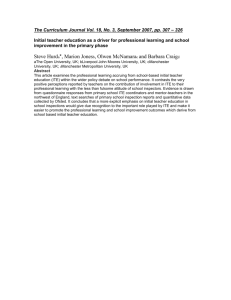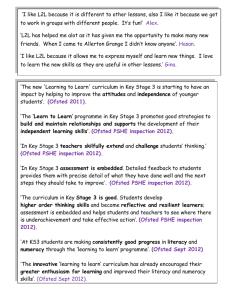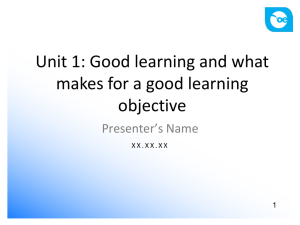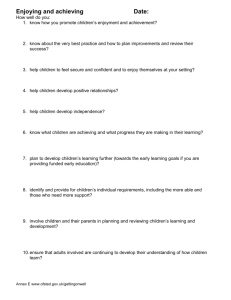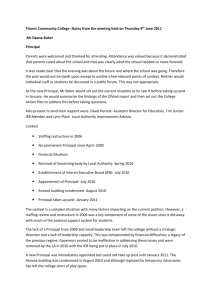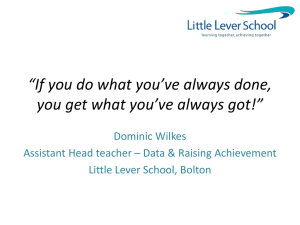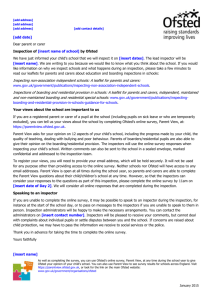Speech, Language and Communication Progression Tools
advertisement
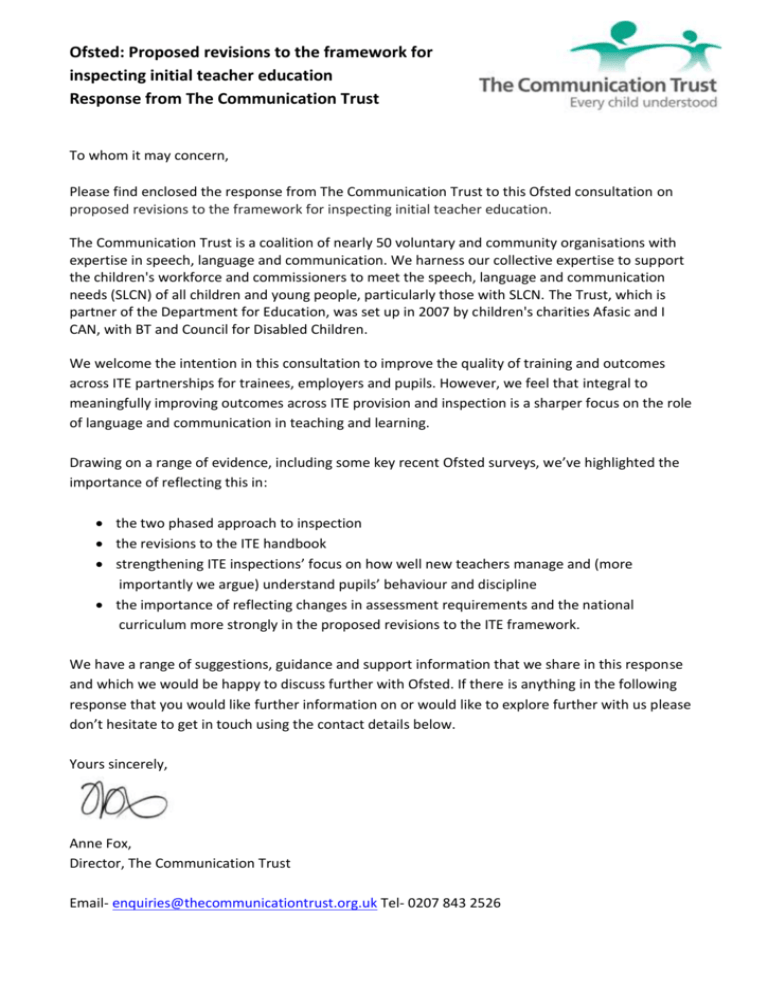
Ofsted: Proposed revisions to the framework for inspecting initial teacher education Response from The Communication Trust To whom it may concern, Please find enclosed the response from The Communication Trust to this Ofsted consultation on proposed revisions to the framework for inspecting initial teacher education. The Communication Trust is a coalition of nearly 50 voluntary and community organisations with expertise in speech, language and communication. We harness our collective expertise to support the children's workforce and commissioners to meet the speech, language and communication needs (SLCN) of all children and young people, particularly those with SLCN. The Trust, which is partner of the Department for Education, was set up in 2007 by children's charities Afasic and I CAN, with BT and Council for Disabled Children. We welcome the intention in this consultation to improve the quality of training and outcomes across ITE partnerships for trainees, employers and pupils. However, we feel that integral to meaningfully improving outcomes across ITE provision and inspection is a sharper focus on the role of language and communication in teaching and learning. Drawing on a range of evidence, including some key recent Ofsted surveys, we’ve highlighted the importance of reflecting this in: the two phased approach to inspection the revisions to the ITE handbook strengthening ITE inspections’ focus on how well new teachers manage and (more importantly we argue) understand pupils’ behaviour and discipline the importance of reflecting changes in assessment requirements and the national curriculum more strongly in the proposed revisions to the ITE framework. We have a range of suggestions, guidance and support information that we share in this response and which we would be happy to discuss further with Ofsted. If there is anything in the following response that you would like further information on or would like to explore further with us please don’t hesitate to get in touch using the contact details below. Yours sincerely, Anne Fox, Director, The Communication Trust Email- enquiries@thecommunicationtrust.org.uk Tel- 0207 843 2526 Response from The Communication Trust 1) Two-stage approach to the inspection of ITE partnerships We welcome the two staged approach to direct observation which we feel could play an important role in strengthening the practice of emerging teachers. This strengthening is especially important for emerging teachers to understand and be able to effectively teach speech, language and communication skills. The 2012 Ofsted report “From training to teaching early language and literacy” i found that in their first term less than half of new teachers were teaching language and literacy well and ensuring that good progress was being madeii. The NQT survey 2013 also highlights that NQTs themselves feel this is an area of weakness for them, with preparation to teach language comprehension getting the lowest good/very good rating- 67% of all questions relating to teaching and learning. This means that around one third of primary NQTs felt their preparation to teach language comprehension was only adequate or poor. We feel that the proposed two phased approach will support emerging teachers to develop and embed good teaching practice in relation to speech, language and communication. To further strengthen this embedding process however, we feel that providers, schools and Ofsted inspectors could benefit from having access to materials and information providing guidance on this crucial issue. 2) Highlighting the role of speech, language and communication skills to support proposed revisions to the ITE handbook The proposed enhancements to the outline guidance and criteria in the ITE inspection handbook are welcome. In particular those outlined in paragraph 12 around the quality of training will focus in on some of the key competencies trainees will need to have to best support children with SLCN (speech, language and communication needs). There is evidence documenting strongly the links between poor language and low attainment, the dramatically increased likelihood of language delay for children from poorer back grounds and the central importance of profiling and continuous assessment for monitoring and meeting the changing needs of children with SLCN, especially in the early years. Language impairment is a significant factor for low achievement, with language difficulties important factors for predicting attainment on key stage 1 and 2 English and Maths national curriculum testsiii. Studies have shown that in some areas of social deprivation, upwards of 50%iv of children enter school with delayed language. The landmark Better Communication Research Programme found that when done by teachers with appropriate training, ongoing profiling and monitoring of children’s needs through the Early Years, KS1 and beyond is effective in identifying children at risk of educational difficulties including SLCN in particularv. 1 These well evidenced links are really important for emerging teachers and those inspecting them to understand and incorporate into their work. Ofsted research has shown that this is an area in which emerging primary school teachers struggle, noting that ‘not enough new teachers had consistent high-quality training during initial teacher education and induction to ensure that they developed good teaching skills, underpinned by a deep understanding of language development and the acquisition of literacy skills’ vi. In “From training to teaching early language and literacy”vii, Ofsted made a series of detailed recommendations around improving emerging teachers’ focus on language. We very much supported and welcomed these recommendations and feel reflecting them in the proposed revisions to the inspection framework would strengthen the proposals significantly for trainees, providers and pupils. 3) Focus on management of behaviour and discipline in the framework, handbook and guidance for focussed monitoring inspections Though we welcome a clearer focus on the quality of training in the management of pupil/learner behaviour and discipline in measuring the overall effectiveness of ITE provision, we feel any such focus needs to have at its core a commitment to supporting emerging teachers to understand the possible causes and background to challenging behaviour. The links between language difficulties and difficult behaviour are well evidenced. In early development, language levels directly impact on self-regulation skills of children and therefore on their behaviourviii. We know many children with SLCN have significant behavioural difficulties, some of which mask underlying impairments in languageix. Research has shown that children and young people with SLCN are more likely to have significant peer problems and emotional difficulties as well as less developed pro-social behaviour than the general population of the same agex. It is essential that ITE inspection frameworks and criteria measure trainees’ understanding of this complex relationship, and the role of teachers’ language in maintaining positive behaviour, and also that the behaviour management strategies on which teachers are inspected reflect and build on the wealth of evidence highlighting the links between language, learning and behaviour. The revisions to the criteria to place a stronger emphasis on the role teachers must play in managing pupils’ behaviour and discipline need to assess not just their ability to manage behaviour, but also that they have a deeper understanding of what may be causing behavioural issues and the ways in which pupil and adult language can address these. We’d like to see the wording and context to revisions made to reflect this. 4) Reflecting changes in assessment requirements and the national curriculum more strongly in the proposed revisions to the ITE framework 2 The Ofsted “From training to teaching early language and literacy” 2012 report found that over 30% of new teachers did not have sufficiently in-depth training in assessing pupils’ skills and knowledge in language and literacy to be able to use their judgements effectively to plan lessons and decide how to give extra help. Through the new arrangements for assessment and changes to National Curriculum, we know schools are increasingly being encouraged and expected to “have the freedom to design their own assessments against the new national curriculum.”xi It will be essential that ITE provision and inspection ensure trainees have the skills they’ll need to effectively feed into this process and this will be especially important for speaking and listening assessment and supporting those children who have additional needs in this area. The recent Ofqual decision to remove the speaking and listening element from GCSE English assessments highlights the difficulties teachers have faced in assessing and monitoring pupils’ language development robustly and further highlights this as an area requiring improvement. Effective monitoring and assessment are essential not only for grades and attainment tracking but, crucially, for flagging where a pupil is struggling and triggering support and investigation into why. The BCRP study really highlighted the effectiveness ongoing monitoring has in supporting welltrained teachers in accurately identifying children at risk of educational difficultiesxii. In order for trainees to meet the teacher standards in relation to assessment, we feel that a stronger focus on developing skills relating to speaking and listening is crucial. Support The Communication Trust can offer to improve the focus on speech, language and communication across ITE and NQT provision We have a wide range of information that gives clear and accessible messages about the crucial role language plays and how teachers should support language development in children developing typically and for those who are struggling. This information is readily available in our existing publications and we would be very happy to work with Ofsted to pull it together in the format that would be most practical. Our professional team and Consortium members are experts in this field and would be pleased to discuss any of these issues or potential support offers with Ofsted further. In particular some of our publications that trainee and emerging teachers may find most useful are listed below. A full list of the resources we have available can be found on our websitewww.thecommunicationtrust.org.uk/resources Let’s Talk About It- what new teachers need to know about children’s communication skills Speech, Language and Communication Progression Tools Universally Speaking- The ages and stages of language development 0-5, 5-11, 11-18 Don’t Get Me Wrong The speech, language and communication framework Consortium Catalogue of resources 3 References i Ofsted survey, (2012) From training to teaching early language and literacy: The Effectiveness of training to teach language and literacy in primary schools ii Ibid. iii Dockrell, J., Ricketts, J., Palikara, O., Charman, T., and Lindsay, G., (2012) Profiles of need and provision for children with language impairments and autism spectrum disorders in mainstream schools: A prospective study. Better Communication Research Programme. iv Locke, E., Ginsborg, J., and Peers, I. (2002) Development and Disadvantage: implications for early years. International Journal of Language & Communication Disorders. 27 (1). P.3 -15. v Snowling. M., Hulme. C., Bailey. M, Stothard. S, Lindsay. G. (2012) Language and Literacy Attainment of Pupils during Early Years and through KS2: Does teacher assessment at five provide a valid measure of children’s current and future educational attainments? Better Communication Research Programme. vi Ofsted survey, (2012) From training to teaching early language and literacy: The Effectiveness of training to teach language and literacy in primary schools vii Ibid. viii Vallotton, C., and Ayoub, C. (2011) Use your words: The role of language in the development of toddlers’ selfregulation. Early Childhood Research Quarterly. 26 (2). p. 169–181. ix Clegg, J. (2004) Language and behaviour: an explanatory study of pupils in an exclusion unit. British Psychological Society Development Section Annual Conference, Leeds. x Lindsay, G. & Dockrell, J. (2012). The relationship between speech, language and communication needs (SLCN) and behavioural, emotional and social difficulties (BESD). London: DfE. xi Department for Education, Reforming qualifications and the curriculum to better prepare pupils for life after school. (2013) https://www.gov.uk/government/policies/reforming-qualifications-and-the-curriculum-to-better-preparepupils-for-life-after-school xii Snowling. M., Hulme. C., Bailey. M, Stothard. S, Lindsay. G. (2012) Language and Literacy Attainment of Pupils during Early Years and through KS2: Does teacher assessment at five provide a valid measure of children’s current and future educational attainments? Better Communication Research Programme. 4
